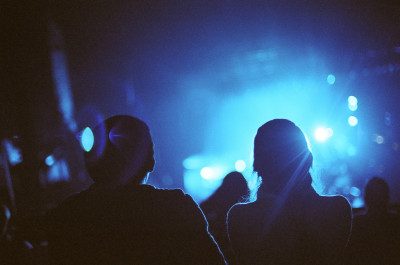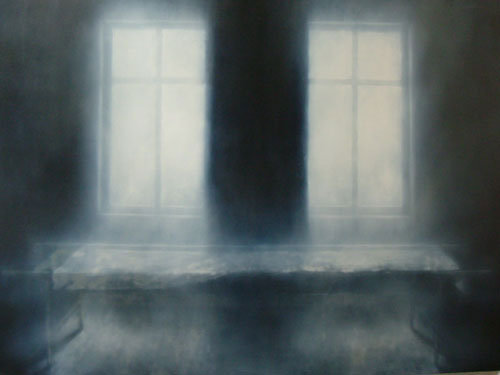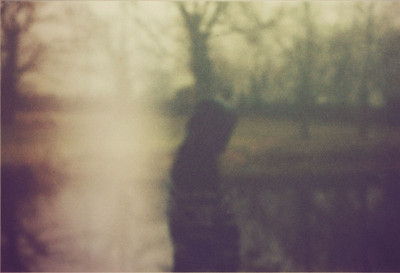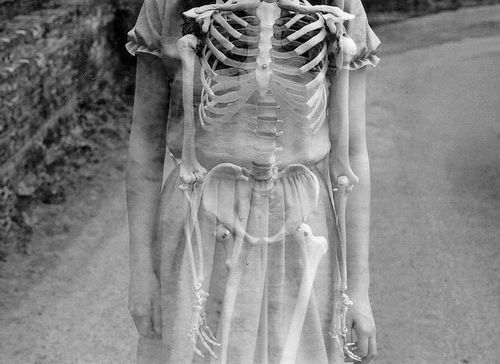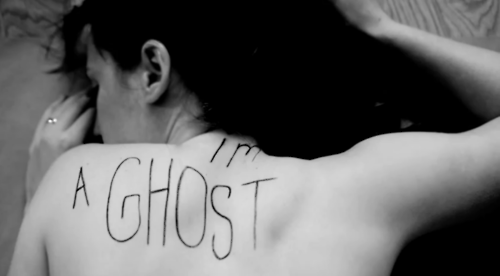image: white screen
voice-over:
I guess I should begin with an apology for not being able to show you a picture so far. Now that the credits have finished we usually get into the film, and start to see what’s happening. But the truth is I just don’t have enough money. Even when I told them at the lab how disappointed people would be to have to watch a film without images, they couldn’t give me any credit. They said it would look okay when it transferred to video. I feel especially bad about the beginning because it was going to be really special. Maybe you can imagine it. Deep in the Paris underground a large man passes through the turnstiles. Caught between the heartbreak of departure and the guilt of arrival. A young couple approaches and, without warning, throws their baby into his arms, pleading with him to keep it. Stunned, he can only look on while the young man robs him and the mother snatches back her child. Because their own parents are unknown, they seek their inheritance from strangers. It’s a true story, Michelle told me when she got back from Paris. I wanted to get Jean Pierre Léaud to play the lead because he’s so fat now no one recognizes him, so he has to start all over again. From scratch. Just like me. But there was no hiding the fact I didn’t have the money; even Jean Pierre needs to eat. The cinema is all money but the money figures twice. First you spend all your time running to get the money to make the film. But then the money comes back again, in the image. The cost of identity is high when the making of images is determined by their distribution.
I should probably tell you before we get any further that I wasn’t quite straight with you when I said I didn’t have any money. The fact is I borrowed a little from a friend, just enough for one image. But I didn’t want to give it away right at the beginning, not before telling you the story first. I thought I’d save it for later so you’d have something to look forward to. I guess this is all sort of an hors d’oeuvre before we can get to the place where I’m able to show something, and you’re able to see it.
This is my favourite time for a movie anyway, before the curtain rises, or when the projectionist is a little hung-over and runs all of the countdown before the movie. It’s at that moment the film is completely pure for me because it’s exactly what I want to see. It’s at that moment the film most perfectly becomes you, like in that saying, “This dress becomes you.” Or, “That’s a becoming passport photo.” After the film starts you can already feel the change taking place, as that pure sort of expectation gets taken away by this thing, this movie, until in the end there’s really nothing left of you at all.
When Mary and I would go to see the pictures we would shake a little when the screen lit up. But most of the time we were just disappointed. The pictures were dated, they flickered, and Elizabeth Taylor had aged terribly. It made us sad. This wasn’t the film we’d dreamed of. This wasn’t the total film each of us carried inside, the film we wanted to make, or more secretly no doubt, that we wanted to live.
As a filmmaker I start with everything in the world: a stairwell, a face turning, an unmade bed. My camera never stops at its subject. It never says no, not this one, this is too much for me. Or I’d like to think about this first. So as a filmmaker you always begin at the same place: with everything. With every image. And from there you have to make a choice. The back of his leg with an open letter, the unmade bed with a glass bearing lipstick traces. For me, film isn’t so much an act of tracing or making likeness, but a composition thing, an arrangement of parts, a relationship.
Two weeks ago at work we were let out for the night to have a look at another photo lab. Most of us saw it as a chance to take some time off, grab a couple of beers downtown, make an appearance at this place and still get paid. Things changed when we arrived. We watched a woman feed a picture of an ocean liner into a computer so new-looking a couple of us almost sat down in it. The photograph showed an old liner, one of the first to roll out of dry dock after the First War, and we watched it quietly sailing, without a soul on deck, under clear skies and calm waters. I think it was going to be used for a whiskey ad. Entering numbers, the operator changed the colour of the sky from a mid-afternoon cyan to a twilight purple, added dark storm clouds along the horizon and a sun at the left border. Then she started to work on the water, asking us whether we preferred large waves or small, making them conform perfectly to the prow of the ship. People appeared on deck: children from the Sudan, fathers from the Napoleonic wars and women from the Restoration. When she was finished she entered a final command that would make a photograph of the new scene. While we were being taken upstairs to eat the negative would be processed and printed, so we could all leave with this reminder in our hands that there was no need to make objects in a world already filled with them. Today there is only recycling. The Buddhists have even made a religion out of it. Granted it a faith. They call it reincarnation.
When you meet up with another person you never think, well, this is all there is. You never think of people ending but they do. Some end with their father, or in their mouth, or in their sex, and then it’s time to leave. You know it just by the look in their eyes, the way they say hello. You go away because there isn’t any more. There’s nothing left. I always think about the people who make buildings and then they’re not around anymore. Or a movie with a crowd scene and everybody’s dead now. It’s frightening.
I’ve always held onto this idea of filmmaking being able to take me places I don’t belong, so close to the heart you can only bear watching them again, as an image. It’s like the Medusa story where a simple look turns its viewer to stone, so a shield is used to catch her reflection. It’s the same story in the sealed texts of the apocalypse. They narrated the end of the world with such force the simple act of reading might provoke the events they describe, and would certainly bring about the madness of their reader. Which is why the books were always sealed after they were written. But with an image, with something between your mouth and the words, you might be able to pass into the book and still find your way from the page when the time comes.
I think if not for marriages or funerals a writer would hardly know where to stop. It seems like I’m always caught between the two, between beginning and ending, between never wanting it to start and never wanting it to end. Sometimes when you read a book the writing makes a place for you, and you go to live there for a time, not feeling yourself in the reading so much as looking around in this new place. But even then, even if you like to read the dust jacket after the book’s finished, you still have to close the book and then it’s over. I think of ending like that, as something you can hold in your hand, as something that closes. Before I was taken to the hospital I thought I was more half-there than all-there. That I was watching instead of living life. People say the way things happen in the movies is unreal, but actually the way things happen to you in life is unreal. The movies make emotions look so strong, but when things really do happen to you, it’s like watching television. You don’t feel anything. The best atmosphere I can think of is film because it’s two-dimensional physically and three-dimensional emotionally.
I lived in all the books I read before I was nine, and then I started to watch TV, and things didn’t end so much after that. Even when I had to go to bed I knew it wasn’t over because I could hear my parents laughing. My father told me I was descended from them. And their parents, I asked, where were their parents from? He told me their parents were descended from their parents, and their parents from their parents. So as I thought about the shape of our race, it seemed to describe a large descent, moving from one generation to the next.
Has everyone had a chance to introduce themselves, or is this one of those movie houses where you’re supposed to pretend you can’t see anyone but the people you came with? Maybe, for the people who came late, maybe we could have the lights turned on for a minute, just to have a look around, just to see who’s here. Could the projectionist please turn the lights on for a minute? When Warhol said that everyone in the future would be famous for fifteen minutes I wonder if it wasn’t because eventually we all say the same thing, that all of our words come back to the same point.
I started seeing Lisa when I was fifteen and she was really the first one who thought, well, he wears check flannel trousers with paisley shirts and fly top runners, and I have two-tone jumpers and Kita Kura soap and full bodied hair that falls with the radiant luster of Breck’s PH-balance conditioner, but these differences aren’t everything. These were things that could be looked over, as one looks over an atlas or a book of pictures. It was Lisa who taught me the words that moved between these two places, from one sort of difference to another. She said, “I love you.” And I said it after that in just the same way, and then with everyone after Lisa it was just the same: “I love you.” Until I’d lost the feeling of the word altogether.
So when I met up with Mary after that, there was no way for her to tell I meant nothing I said, that I spoke only from habit and to feel comfortable. After I’d made this place between the meaning of a word and its speaking, my lies were more welcome than when I told the truth. And I wondered about the way a word loses its place inside the mouth. That you could just forget the way a word turns one thing into another like this: “I love you.” If you could gather all the times you had used a word, and lay them in a line one after another, they’d take themselves into a vanishing point. Every word moves toward its own ending, its own death, in the same way we do. And the last word we forget is the word “I” because it’s the one we start with. It’s the story we tell when we stop to speak of ourselves. That we can’t stop telling when we try to speak of someone else.
OK, I guess that’s enough with the lights. Could the projectionist take the house lights down? There’s still that image I’m saving and it’s better with the lights off, or maybe it’s just the habit of theatre. We’ll try it the other way next time.
I like the idea that people in Toronto have to wait in line for movies. You pass so many theatres with long line-ups, but nobody looks down about it. It costs so much to live now that if you’re on a date, you can spend your whole date time in line. You get to know them, you suffer a little together, and then you’re entertained for two hours. The idea of waiting for something makes it more exciting anyway. Never getting in is the most exciting, but after that waiting to get in is the most exciting.
I left for a Christmas party a couple of weeks back and I don’t know what it was but no one had anything to say to each other. We all stood around the kitchen eating and smoking and waiting for IT to come, but IT never did. And I remember thinking that if IT was here, I could just let go of whatever was holding IT in, and it would be okay. Afterwards David said we weren’t there to talk at all but just to look, to see each other in the same place. But without words we might as well be strangers waiting for the light to change, and as a filmmaker there’s always that problem. When people go to the movies they want to see these big dramas, or horror, or violence, or sex, but all people really do in their lives is talk. Now we have people we can call up on the telephone and have sex with, so even sex is talking now. I think that’s something my friends never understood, that movies were never meant to be watched, they were there to say what we couldn’t say. I think it’s the reason I can’t be close with them anymore, they look when they need to listen. And because they don’t know how to listen, they don’t know how to look either.
Seeing and hearing are different. Sight divides while sound unifies and harmonizes. You could say that everything in the world was created by sound and analyzed by seeing. God spoke first and saw that it was good second. It was that way with the first people on earth and still is with the newly born. You can see it in the shape of the ears, they’re made like a whirlpool, spiraling inside, while the eyes bulge from the socket. We’re always at the edge of visual space, looking in with the eye. But we’re always at the centre of a sound space, listening out with the ear. Our visual orientation faces front, but sound is always centered. If I want to change the world I have to become visionary, but if I want the world to change me, I need to learn to listen.
If it’s true what they say, that a picture is worth a thousand words, then why does it have to be a saying? This tradition we have of silence goes back to the very earliest days of the movies when movies were silent too, and a filmmaker was a person interested only in the part of life that could be kept inside a camera. Even in some of today’s independent film, there are filmmakers who have taken this vow of silence, whose films can’t be heard at all; they feel their images are enough. Maybe the time has come for a cinema without images, for a movie-house dialogue that will meet us halfway between sound and sight, that will leave us a place for our own pictures.
